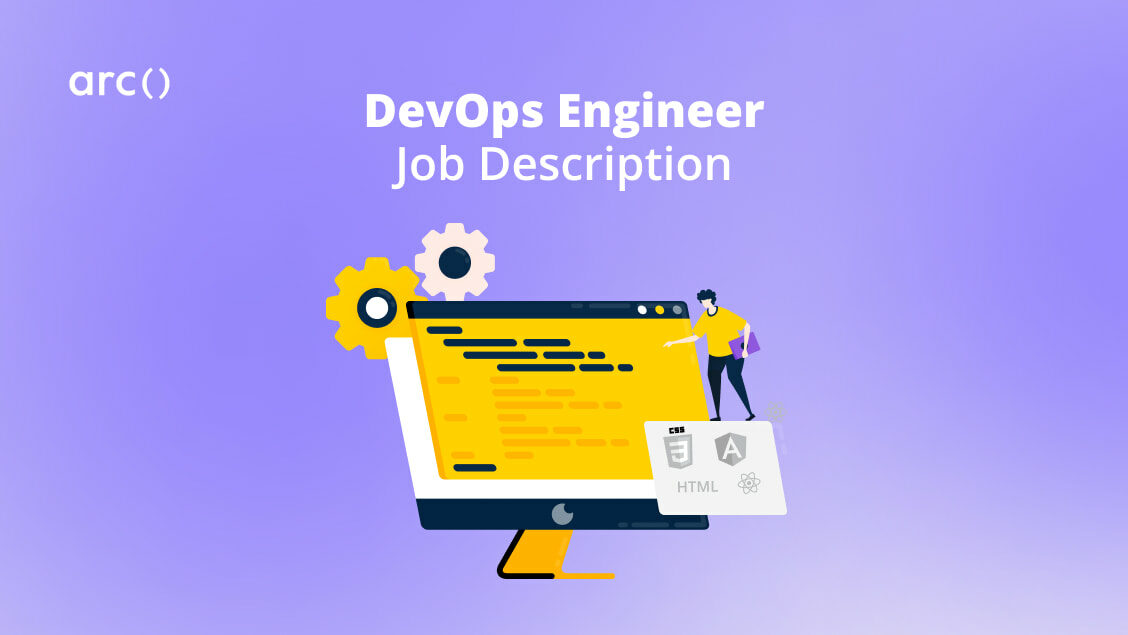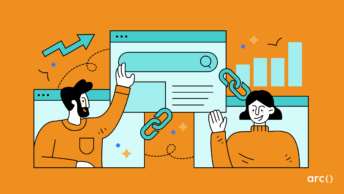Hiring top-tier DevOps engineers is critical for modern companies to thrive. However, it’s not always an easy task. DevOps jobs are in high demand right now, and finding the right people for your team will require you to put in some work.
More and more companies across all industries are marketing digital solutions to improve customer relationships and get a competitive edge. Up to 86% of organizations recognize the importance of developing and producing new software quickly — or, at least, before a more agile contender beats them to it. That’s where recruiting a DevOps rockstar comes in handy.
But where do you find this mythical creature, and (perhaps most importantly) how do you get them to apply for a position in your company?
Long story short: you need to write a compelling DevOps engineer job description that clearly states what you’re looking for.
Easier said than done?
Below you’ll find all the information you need to write a DevOps job description that will make the history books, including:
- Our DevOps job description template.
- Step-by-step instructions on how to write a killer job description for DevOps specialists.
- A real-life DevOps job description example or two — for inspiration, of course.
- Tips and tricks to grab the candidates’ attention and get them to apply.
Let’s get started!
Looking for top talent fast? See how Arc can help you:
⚡️ Find developers, designers, marketers, and more
⚡️ Freelance or full-time remote + fully vetted
⚡️ Save up to 80% with global hires
Hire top talent with Arc risk-free →
Sample DevOps Engineer Job Description Template
Writing a clear and comprehensive role description to find a one-of-a-kind DevOps specialist may seem a little daunting. If this is your first rodeo — and even if it’s not — here’s a solid senior DevOps engineer job description template you can copy-paste and edit to your needs.
We won’t tell if you don’t! 😉
Senior DevOps Engineer - Back-End (Remote) Location United States (Remote) Who We Are Our Company is a 100% remote organization founded in San Francisco, California. We’re passionate about helping businesses scale their developing teams while fostering freedom and work-life balance. In Our Company, we believe in the importance of following your passions. That’s why we encourage our employees to do what they love and offer them self-growth incentives. We pride ourselves on motivating and inspiring our community members to be the best version of themselves. Our Company has worked with big, innovative brands like Google, Twitter, Coinbase, and more. What You’ll Bring As a member of our back-end DevOps team, you’ll design and implement Infrastructure as a Code (IaaC) GitOps workflow with Terraform in a scalable way. You’ll help us improve the infrastructure automation and the quality and security of the code. Role Responsibilities • Challenging the status quo when implementing automation. • Developing innovative solutions to common business problems. • Applying solid principles of web technologies. • Understanding performant system cloud architecture. Must-Have Qualifications • Bachelor's degree in Computer Science or related field of study. • 2+ years of experience as a full-time DevOps engineer or 1+ years of experience as an intern in DevOps teams • Working experience in AWS, GCP, or Azure Cloud platforms. • Basic knowledge/experience in Linux fundamentals and scripting. • Familiarity with CI/CD tools such as Jenkins, GitHub Actions Nice-to-Have Qualifications • AWS cloud certification • Experience in Terraform • Experience in Python/Golang programming Compensation & Benefits • $98.1K to $124K per year • Tuition reimbursement • Unlimited paid vacation • Paid parental leave • Medical, dental, and vision insurance • Paid gym membership • Unlimited self-growth courses Get In Touch! At Our Company, we’re an energetic team that supports each other to become our best selves. If you’re ready to take the next step in your DevOps engineering career while within a company that encourages growth, shoot us an email today!
Keep in mind that job descriptions for DevOps engineers are never a one-size-fits-all, cookie-cutter document.
At the end of the day, you have to do what makes the most sense for you.
Check out our entire set of tech job descriptions and choose the one which fits your hiring needs best:
- Software Engineer Job Description
- Python Developer Job Description
- Front-End Developer Job Description
- Angular Developer Job Description
- Back-End Developer Job Description
- Cloud Architect Job Description
- JavaScript Developer Job Description
- AWS Cloud Engineer Job Description
- AWS Cloud Practitioner Job Description
- AWS Cloud Architect Job Description
- Scrum Master Job Description
- Full Stack Developer Job Description
- Node.js Developer Job Description
- Cloud Engineer Job Description
- DevOps Engineer Job Description
- Web Developer Job Description
- React Developer Job Description
- Ruby on Rails Developer Job Description
- Agile Product Owner Job Description
- Agile Project Manager Job Description
- Remote Developer Job Description
Or, say goodbye to writing job descriptions altogether with HireAI. Discover top remote developers instantly without manual searching and screening. Try HireAI now!
How to Write a DevOps Engineer Job Description
Writing a job description to attract the best candidates and receive more applications shouldn’t be rocket science. That’s why we’ve prepared a step-by-step guide for you to follow.
The outline of your DevOps job description may vary depending on many factors. For example, if you’re writing for a renowned company, you might be able to get away with skipping the “About us” section altogether or placing it below more critical information.
Because you have limited time to catch your applicants’ attention, writing a job description that’s too long may do more harm than good. Keep your JD brief and scannable, and make sure to add only relevant information regarding the position and your expectations.
Pro Tip: Keep the most important facts up top, so that job seekers are less likely to miss them.
The sections detailed below are just for guidance. Feel free to handpick those you consider would draw your ideal candidate’s attention.
1. Job title
The job title is the hook that will invite your applicants to read your full DevOps job description. It’s the first thing they’ll see when they stumble upon your listing online, so it’s vital to get it right if you want to get them to click on it.
Keep in mind that, while browsing a job board like LinkedIn, Glassdoor, or our very own here at Arc, the talent will have numerous options to choose from. If you don’t keep your title enticing and detailed enough, all of your other JD-writing efforts will likely go to waste.
Here are two job title examples to give you a better sense of what we’re talking about:
Bad Example:
DevOps Engineer
Good Example:
Senior CI/CD DevOps Engineer – Front-End – Bilingual (Full Remote)
While you don’t want to turn your job title into a paragraph, you must ensure it gives away just enough information to make your listing attractive. Writing something like “DevOps Engineer” is a little too generic and won’t spark much interest among potential applicants.
Instead, equip your job title with essentials, such as:
- The required seniority level,
- Type of DevOps engineer, and
- Area of expertise.
To make it more descriptive, you can also include:
- Working location,
- Required DevOps certifications,
- Additional must-haves, and
- Any other differentiators you need applicants to know straight away.
2. About the company
You don’t have to be an industry giant to get the best DevOps engineers. Even startups and small businesses can attract top-notch DevOps specialists if they properly introduce themselves.
An “About us” section is the perfect place to talk about what sets your business apart from others in your sector. Here’s where you can give candidates a sneak peek of what you do, your goals in the industry, your company culture, your ideals, and more.
If there’s something you think makes you stand out from the crowd in the vast IT universe, add it here!
Here’s a great DevOps job description example from PlayStation we borrowed from Glassdoor:
Why PlayStation? PlayStation isn't just the Best Place to Play — it's also the Best Place to Work. Today, we're recognized as a global leader in entertainment producing The PlayStation family of products and services including PlayStation®5, PlayStation®4, PlayStation®VR, PlayStation®Plus, PlayStation™Now, acclaimed PlayStation software titles from PlayStation Studios, and more. PlayStation also strives to create an inclusive environment that empowers employees and embraces diversity. We welcome and encourage everyone who has a passion and curiosity for innovation, technology, and play to explore our open positions and join our growing global team. The PlayStation brand falls under Sony Interactive Entertainment, a wholly-owned subsidiary of Sony Corporation.
Job seekers can go through dozens of job descriptions in a day, so they probably don’t have too much time to spend reading your company’s full life, work, and miracles. However, if there’s any extra information you’d like to share, you can always link them to any pages in your corporate site you deem appropriate — think “About us,” “Mission statement,” “Meet the team.”
3. Role summary
A well-versed DevOps engineer probably already knows what their job entails. Still, no two companies have the same exact needs. That’s why you’ll want your job description to communicate what working as a DevOps specialist in your team would look like.
A brief high-level outline of the job should suffice to let applicants know what to expect.
Here’s a great role summary example from a BI/DO DevOps engineer job description at California State University we found through Indeed:
The California State University, Office of the Chancellor, is seeking a BI/DO DevOps Engineer to perform a critical function in establishing best practices around devops for the CSU, Chancellors Office. DevOps has evolved over the last 15 years as a critical component in delivery against an automated tool stack for securing and deploying code in multiple environments in a testable manner. This person will work on building the DevOps stack against which all developers code which be built. They will be responsible for tools such as Jenkins, Airflow, Terraform, Ansible to orchestrate and configure instances. This includes dataops, security, architecture, and CI/ CD components. The incumbent is responsible for leading and ensuring integration of infrastructure operations in alignment with CSU Business Intelligence/ Data Warehouse's priorities to support CHRS, as well as utilization of insightful approaches to devops management, devops analysis and delivery of innovative solutions to complex business problems. The incumbent will have experience and knowledge of full life cycle of DevOps implementation processes, from analyzing business requirements through leading cloud design, infrastructure design and cloud security to keep with CSU Business Intelligence/ Data Warehouse's data and operations in alignment with state and federal standards and requirements assuring safety of CHRS data.
Not sure how to name this section? “Position information,” “About the job,” and “Job summary” are some excellent ideas.
4. Duties and responsibilities
You’ll also need to give applicants more detailed information on what their day-to-day will look like working for you. If your job summary is already too extensive, consider writing a separate, more scannable section.
Using bullet points is not a must, but it’ll definitely help retain the job seeker’s attention as they read through a day in the life of a DevOps engineer in your company. Remember to mention all relevant roles and responsibilities they’ll be performing, as well as the tools they’ll use to complete each task.
Here’s a sample senior DevOps manager job description for Citibank found via LinkedIn:
Responsibilities include: • As a DevOps Manager, you will help us revolutionize our test, deployment, and production infrastructure allowing fast, safe, and cost-effective releases • You will take advantage of cutting-edge technologies to improve automation capabilities of the infrastructure supported throughout our organization • You will work with the Architecture Team to ensure that our CI/CD infrastructure meets the needs of our development efforts, reliability and scalability expectations • Develop continuous integration, deployment, and infrastructure automation strategies
5. Must-have skills and experience
Here you’ll explain what you expect candidates to bring to the table. However, try not to make the position seem unattainable. You don’t want to deter job seekers from applying, so stick to must-haves and don’t include anything that’s not necessarily a deal-breaker. Using a bulleted list will help candidates digest this section more easily and retain the information presented.
Here’s a great example from a TikTok job ad seeking a Cloud DevOps engineer found on LinkedIn:
Minimum qualifications • Master’s degree (or Bachelor's degree with 3+) years of experience in Computer Engineering, Electrical Engineering, Computer Science or related major • 3+ years experience working with Unix Linux systems from kernel to shell and beyond • 3+ scripting experience in Shell and Python.
You can name this section “minimum qualifications,” “job experience,” “ job requirements,” or “what you’ll bring.”
6. Nice-to-have skills and experience
Now here’s where you can share the abilities and expertise your ideal candidate would have. You could think of this section as some kind of wishlist in which you can include those special DevOps engineer skills that could give applicants extra points to land the job.
Here’s an example from Amazon retrieved from AmazonJobs:
PREFERRED QUALIFICATIONS • Experience with Chef, Puppet, Salt, or Ansible in production environments. • Knowledge of IP networking, VPN's, DNS, load balancing and firewall. • Experience with monitoring and log aggregating frameworks such as Kafka, Logstash, Splunk, ElastiSearch, and Kibana. • Experience implementing and designing cloud native security concepts, DevSecOps, or MLOps. • AWS Certification(s) such as Solutions Architect Pro, DevOps Engineer Pro, SysOps Admin, Developer Associate. • Strong presentation, verbal communication and written communications skills. • Ability to lead effectively across organizations and engagements, preferably from a professional services organization or similar.
Keep in mind this section requires enlisting numerous characteristics, so using bullets may be helpful to keep things neatly organized.
7. Requirements on education or certifications
DevOps professionals need a deep understanding of IT fundamentals to succeed in their roles. That’s why many DevOps engineers start their career paths by getting a bachelor’s degree in mathematics, software engineering, computer science, or other related fields.
However, times are changing, and the industry is more open than ever to self-taught DevOps specialists. Therefore, you can opt to give applicants a chance even if they’ve followed non-traditional methods to gain expertise in the DevOps sector and ditch the educational requirements altogether.
If, for any reason, you do need to include this section (e.g., your company is big on graduate and post-graduate education), make sure to clarify the lowest level required to perform DevOps functions in the position you’re advertising. Also, don’t forget to mention any desirable areas of study.
Need candidates to have any specific DevOps certifications? Make sure you explain all licensing conditions clearly. Additionally, if your company collaborates with the government, here’s where you can add all clearance requirements.
8. Working time and location
Given the current climate, many companies are running fully or partially online. If your organization is open to remote or hybrid hires, you’ll need to let applicants know in your job ad. In addition, don’t forget to explain your work hours expectations or whether you encourage self-scheduling.
On the flip side, your organizations might be more traditional and prefer to ask employees to perform their daily tasks on-site. In that case, you’ll have to specify the location of your offices and operating hours clearly. You should also explain if you’re willing to offer relocation services for applicants who currently live in a different city — or even a foreign country.
In both scenarios, you’ll have to define if the position requires working extra hours, weekends, or on-call. For hybrid models, you could mention if in-person meetings are set to happen on a specific day of the week and time (e.g., you have status meetings every Monday at 10 am).
Lastly, you can use this section to clarify if your organization can only hire candidates with legal authorization to work in a specific country and if you offer visa sponsorships.
9. Compensation, perks, and benefits
Some companies like to be mysterious about pay and benefits in their job descriptions. Don’t be one of them. Applicants appreciate when JDs state paid and unpaid compensation openly instead of keeping them guessing. Some items you can include in this section are:
- Annual salary range
- Paid time off policy
- Health insurance coverage
- Professional growth or tuition reimbursement
- Performance and referral bonuses
- Software, hardware, and other equipment
- Remote work office stipend
- Ownership, equity, and/or stock options
- 401(k) and retirement savings programs
- Spending accounts
- Parental, sick, and bereavement leave
- Company retreats and team bonding activities
- Subscriptions and memberships
- Corporate social events, company lunches, and happy hours
If compensation will be based on experience or performance, you’ll need to stipulate it here. Keep the average DevOps salary in mind to ensure your numbers check with what applicants might expect.
10. Looking ahead: 1 month, 3 months, 1 year, etc.
While not strictly necessary, this section could help DevOps engineer applicants understand what success looks like in the advertised role. In addition, it will give them valuable insight into what you expect from them in the long run.
Here’s a sample from a leadership position in engineering at Boulevard as seen on its website:
After 1 month you’ll... • Graduate from Boulevard’s platform training course • Connect with the engineering team and key employee management stakeholders across the company • Learn and understand the core business objectives and areas for improvement • Learn about our year-end goals, and what your team needs to accomplish in order to deliver on company objectives. • Assess the hiring needs for your team. Understand our hiring process, and identify what we need to do in order to grow. After 3 months you’ll... • Ensure your team’s adherence to a documented Software Development Life Cycle (SDLC) • Have suggested best practices and improvements for career growth planning and mentorship • Begin to pick up and learn new tools and technologies for your own career growth. • Understand the strengths and weaknesses of each member of your team, what’s working well, and have clear career trajectories in progress for each member of your team. • Understand your progress towards company goals and have communicated risks, opportunities, weaknesses, and strengths with your peers and executives. After 6 months you’ll... • Be a key part of a growing team - partly due to your involvement in interviews and hiring. • Have delivered key milestones for projects to our customers, and have the team dynamics in place to support and iterate on the areas of the product under your domain. • Continue expanding your knowledge for your own career development and work on countless opportunities that have a meaningful impact to the business’ bottom line.
11. Other job description sections to consider
Depending on your unique needs, you might have to incorporate more information into your DevOps job description.
Here are some helpful ideas to consider:
Company culture – If you’re particularly proud of the shared values, goals, and practices within your organization, flaunt them! Showing off how awesome your workplace environment is could make the whole difference when convincing candidates to apply for the advertised position.
How to apply – Do you have your very own application process? Then you must dedicate a section in your job description to clearly explain it step by step. This will save you and your applicants valuable time and effort.
Point of contact – You can always provide applicants with your contact information so that they can reach out should they have any questions. Besides being a thoughtful gesture, it’ll let you measure your job description’s effectiveness.
Legalese – If required by local or national legislation, make sure to include your privacy and data processing policy. You could also need to add an equal employment opportunity statement.
Tech stack – You could give your DevOps candidates a sneak peek into the technologies they’ll be using to carry out their daily tasks.
Our ideal candidate is – Further expand your “nice-to-have” qualifications section. Add a short paragraph describing the soft skills and interests you’d appreciate in your applicants.
Employment type – Let candidates know whether they’ll be freelancing or working full-time, part-time, etc.
Internal position title – Sometimes companies have their own internal code names for a specific position. If that’s the case, you can always share it in your job description.
Screening – Let applicants know if they’ll need to take any pre-employment drug tests, credit checks, or other screening assessments.
Hiring process – Uncertainty during the job hunt can be rather overwhelming. It’s a nice touch to explain what the hiring pipeline looks like in your company so that candidates know what to expect from the moment they apply.
Key dates – Job ads should always come with a clear expiration date. This will avoid unnecessary confusion and keep you from receiving a pile of applications for a job position that’s not vacant anymore.
You can also try Arc, your shortcut to the world’s best remote talent:
⚡️ Access 450,000 top developers, designers, and marketers
⚡️ Vetted and ready to interview
⚡️ Freelance or full-time
Try Arc and hire top talent now →
Tips for Writing a Compelling Job Description for DevOps Engineers
Now that you’re clear on the sections you should include in your DevOps job description, you can get down to work. Here are some helpful suggestions on how to write a persuasive JD to attract the best candidates.
1. Be inclusive in your job description
Not only are discriminatory job ads unconstitutional, but they’ll for sure discourage some groups from applying. That’s why you’ll want to watch your language and keep things neutral and inclusive.
Avoid superlatives and gender-coded buzzwords that bring little to no value. Terms like ninja, champion, unicorn, etc., are problematic and could convey the wrong message. As a result, you might miss out on brilliant applicants.
Also, to prevent the phrasing in your JD from being unconsciously biased, avoid jargon that might seem snobby and be as straightforward as possible.
2. Use text formatting to make your JD easy to read
Clicking on an exciting job title only to find a seemingly never-ending block of text can be quite a turn-off for job seekers. It won’t matter how much time and effort you invested in crafting your DevOps job description; if you don’t go the extra mile and format it, it’s may make candidates bounce.
An organized and structured document is easier on the eye, therefore, more likely to help you convert applicants. To compose a more engaging JD that will help you find the DevOps engineer you’ve been dreaming of, you must:
- Use headings and subheadings to organize your content.
- Highlight keywords and relevant information in bold.
- Add links where it makes sense.
- Use bulleted and numbered lists when possible.
3. Speak directly to them
You don’t want your job description to seem impersonal. Candidates will feel a lot more engaged if you address them directly. That’s why it’s a good idea to use the second person singular point of view in your statements. Bonus points if you refrain from using passive voice.
For example, instead of saying:
“Cloud certification is needed…”
Use this instead:
“You must validate your cloud knowledge with an AWS certification…”
4. Include a specific instruction when applying
The hiring process can lead to receiving dozens, if not hundreds of applications and resumes. To filter out sloppy candidates, you can add specific application instructions towards the end of your JD.
If you need ideas, you could:
- Ask them to apply through your site instead of through the job board when applicable.
- Request candidates to use a particular subject line.
- Require applicants to include a distinct keyword in the email body.
5. End your DevOps job description with a call to action
The ultimate goal of writing a job description is to have job seekers apply. A solid call to action (CTA) will tie your sections together and encourage candidates to take the next step.
You can also try Arc, your shortcut to the world’s best remote talent:
⚡️ Access 450,000 top developers, designers, and marketers
⚡️ Vetted and ready to interview
⚡️ Freelance or full-time








